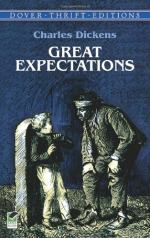I remember that at a later period of my “time,” I used to stand about the churchyard on Sunday evenings when night was falling, comparing my own perspective with the windy marsh view, and making out some likeness between them by thinking how flat and low both were, and how on both there came an unknown way and a dark mist and then the sea. I was quite as dejected on the first working-day of my apprenticeship as in that after-time; but I am glad to know that I never breathed a murmur to Joe while my indentures lasted. It is about the only thing I am glad to know of myself in that connection.
For, though it includes what I proceed to add, all the merit of what I proceed to add was Joe’s. It was not because I was faithful, but because Joe was faithful, that I never ran away and went for a soldier or a sailor. It was not because I had a strong sense of the virtue of industry, but because Joe had a strong sense of the virtue of industry, that I worked with tolerable zeal against the grain. It is not possible to know how far the influence of any amiable honest-hearted duty-doing man flies out into the world; but it is very possible to know how it has touched one’s self in going by, and I know right well, that any good that intermixed itself with my apprenticeship came of plain contented Joe, and not of restlessly aspiring discontented me.
What I wanted, who can say? How can I say, when I never knew? What I dreaded was, that in some unlucky hour I, being at my grimiest and commonest, should lift up my eyes and see Estella looking in at one of the wooden windows of the forge. I was haunted by the fear that she would, sooner or later, find me out, with a black face and hands, doing the coarsest part of my work, and would exult over me and despise me. Often after dark, when I was pulling the bellows for Joe, and we were singing Old Clem, and when the thought how we used to sing it at Miss Havisham’s would seem to show me Estella’s face in the fire, with her pretty hair fluttering in the wind and her eyes scorning me, — often at such a time I would look towards those panels of black night in the wall which the wooden windows then were, and would fancy that I saw her just drawing her face away, and would believe that she had come at last.
After that, when we went in to supper, the place and the meal would have a more homely look than ever, and I would feel more ashamed of home than ever, in my own ungracious breast.
Chapter 15
As I was getting too big for Mr. Wopsle’s great-aunt’s room, my education under that preposterous female terminated. Not, however, until Biddy had imparted to me everything she knew, from the little catalogue of prices, to a comic song she had once bought for a halfpenny. Although the only coherent part of the latter piece of literature were the opening lines,
When I went to Lunnon town sirs, Too rul loo rul Too rul loo rul Wasn’t I done very brown sirs? Too rul loo rul Too rul loo rul




